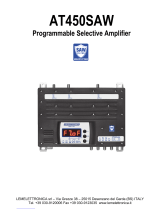Header (gælder alle engelske sider):
TMB Programmable Multiband amplifier
TMB 10A – TMB 10B – TMB 10C – TMB 10S
General information .............................................................................................................................. 2
Safety Instructions ................................................................................................................................3
Installing the unit................................................................................................................................... 4
C
C
o
o
n
n
n
n
e
e
c
c
t
t
i
i
n
n
g
g
t
t
h
h
e
e
u
u
n
n
i
i
t
t ............................................................................................................................. 4
Programming the unit ........................................................................................................................... 5
F
F
a
a
c
c
t
t
o
o
r
r
y
y
r
r
e
e
s
s
e
e
t
t ....................................................................................................................................... 5
D
D
a
a
t
t
e
e
o
o
f
f
m
m
a
a
n
n
u
u
f
f
a
a
c
c
t
t
u
u
r
r
e
e............................................................................................................................ 5
C
C
o
o
n
n
f
f
i
i
g
g
u
u
r
r
i
i
n
n
g
g
t
t
h
h
e
e
u
u
n
n
i
i
t
t ............................................................................................................................. 6
O
O
O
p
p
p
e
e
e
r
r
r
a
a
a
t
t
t
i
i
i
n
n
n
g
g
g
p
p
p
r
r
r
i
i
i
n
n
n
c
c
c
i
i
i
p
p
p
l
l
l
e
e
e
.......................................................................................................................... 6
Menus ..................................................................................................................................................... 6
CHAN.......................................................................................................................................... 6
LEVEL ........................................................................................................................................ 6
C
C
C
H
H
H
A
A
A
N
N
N
M
M
M
e
e
e
n
n
n
u
u
u
.................................................................................................................................... 7
D
D
D
i
i
i
s
s
s
t
t
t
r
r
r
i
i
i
b
b
b
u
u
u
t
t
t
i
i
i
o
o
o
n
n
n
o
o
o
f
f
f
U
U
U
H
H
H
F
F
F
f
f
f
i
i
i
l
l
l
t
t
t
e
e
e
r
r
r
s
s
s
................................................................................................................ 7
U
U
U
H
H
H
F
F
F
f
f
f
i
i
i
l
l
l
t
t
t
e
e
e
r
r
r
w
w
w
i
i
i
d
d
d
t
t
t
h
h
h
(
(
(
C
C
C
H
H
H
A
A
A
N
N
N
m
m
m
e
e
e
n
n
n
u
u
u
)
)
)
.................................
....................................................................... 9
F
F
F
i
i
i
n
n
n
e
e
e
t
t
t
u
u
u
n
n
n
i
i
i
n
n
n
g
g
g
.................................................................................................................................... 10
C
C
C
o
o
o
n
n
n
f
f
f
i
i
i
g
g
g
u
u
u
r
r
r
i
i
i
n
n
n
g
g
g
t
t
t
h
h
h
e
e
e
a
a
a
t
t
t
t
t
t
e
e
e
n
n
n
u
u
u
a
a
a
t
t
t
o
o
o
r
r
r
s
s
s
(
(
(
L
L
L
E
E
E
V
V
V
E
E
E
L
L
L
m
m
m
e
e
e
n
n
n
u
u
u
)
)
)
.................................................................................. 11
A
A
A
u
u
u
t
t
t
o
o
o
m
m
m
a
a
a
t
t
t
i
i
i
c
c
c
U
U
U
H
H
H
F
F
F
g
g
g
a
a
a
i
i
i
n
n
n
c
c
c
o
o
o
n
n
n
t
t
t
r
r
r
o
o
o
l
l
l
A
A
A
u
u
u
t
t
t
o
o
o
m
m
m
e
e
e
n
n
n
u
u
u
....................................................................................... 12
C
C
C
A
A
A
R
R
R
D
D
D
M
M
M
e
e
e
n
n
n
u
u
u
.................................................................................................................................. 13
S
S
S
A
A
A
T
T
T
M
M
M
e
e
e
n
n
n
u
u
u
..................................................................................................................................... 18
Diagrams .............................................................................................................................................. 19
Technical Specifications..................................................................................................................... 23
Notes..................................................................................................................................................... 25




















